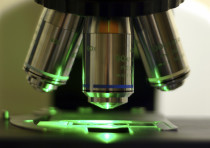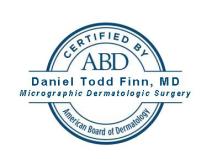
Mohs Micrographic Surgery
Mohs Micrographic Surgery is a procedure designed for the treatment of skin cancers and provides extremely high cure rates while removing the smallest amounts of normal skin as possible. The technique was developed in the late 1930's by Frederick Mohs, a general surgeon at the University of Wisconsin, but was then modified to its current version and popularized over the last 30-40 years. This surgical procedure is performed under local anesthetic usually in an outpatient setting. A patient's skin cancer is removed with a small safety margin of normal skin. This tissue is analyzed in real time under the microscope, so that within one hour the surgeon can inform you as to whether enough tissue was removed or more tumor is present. If enough tissue was removed, the wound can either be allowed to heal on its own, or more often, the wound is sutured closed. If additional tissue is required, the surgeon can precisely map out the location of this residual disease and then remove skin only in the involved locations. The tissue is then re-analyzed and the procedure is repeated, essentially whittling away at the tumor until it is eradicated, leaving as much normal skin as possible untouched by the surgeons knife.
Mohs surgery is not recommended for all types of skin cancers. In fact, most skin cancers are effectively treated with other procedures including standard surgical excision, electrodessication and curretage (scraping and burning), cryotherapy (freezing) or topical creams. Mohs surgery is generally reserved for skin cancers that are located on critical anatomic sites such as the head and neck, where tissue conservation is paramount or for tumors that are ill-defined or have an aggressive pathology. However, some skin cancers are still best treated with a standard surgical excision as are some aggressive tumors located on the trunk and extremities.
The decision on how to best treat your skin cancer can depend upon other factors as well. After meeting with our physicians, you will be provided with the best treatment options for your particular tumor.
Surgical Excisions
A standard surgical excision is one of the more common and effective methods for treating skin cancers. This procedure is performed under local anesthesia and can usually be completed within 1 hour. With this technique, a standard margin of normal skin is removed around the tumor in the shape of an ellipse or football, allowing the cancer to be removed and the defect to be sewn up into a straight line. The tissue is sent to an outside laboratory and analyzed to be sure that the tumor has been completely removed. This technique is often reserved for smaller tumors or tumors that are located in areas where there is enough laxity to remove the appropriate amount of skin.
"Slow" Mohs Surgery
"Slow" Mohs Surgery is a variant of Mohs surgery that is sometimes utilized to treat skin cancers. The difference between Mohs Surgery and "Slow" Mohs Surgery is processing time. Where Mohs surgery is almost always completed within hours, "Slow" Mohs Surgery is performed over a period of days. The patient arrives each day for a separate layer if one is required. "Slow" Mohs Surgery is only performed for certain tumors that are better visualized using this technique where an overnight processing is required.
Topical Therapies
Not all skin cancers require surgical excision. Some cancers can be treated by topical creams. There are a number of different creams that vary in length of treatment; however, all of the creams result in inflammation of the skin including redness, crusting and discomfort. Despite these known side effects, topical treatments are usually well tolerated and can be extremely effective in destroying large superficial tumors that would otherwise require extensive surgery and reconstructions.



